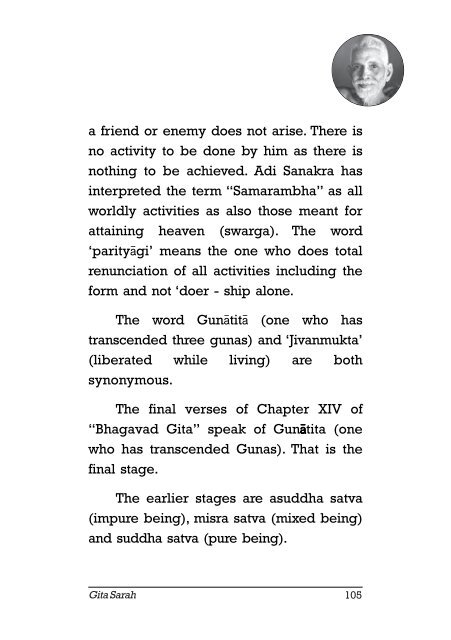- Page 3 and 4:
Gita Sarah
- Page 5 and 6:
Gita Sarah
- Page 7 and 8:
keeping one’s attention fixed on
- Page 9 and 10:
Hiranyakasipu did tapasya, it was f
- Page 11 and 12:
SRI GITASARAH(BY BHAGAGAVAN AN SRI
- Page 13 and 14:
distressed people of their miseries
- Page 15 and 16:
A doubt arises as to how this verse
- Page 17 and 18:
(2) Sri Bhagavan uvacha -Idam sarir
- Page 19 and 20:
a knower of the field (kshetrajna).
- Page 21 and 22:
to transformations, it grows, it de
- Page 23 and 24:
4) Aham¢tm¢ Gud¢kesa sarvabhoot
- Page 25 and 26:
Consciousness. Otherwise you cannot
- Page 27 and 28:
death of a body which, by its very
- Page 29 and 30:
By saying that the Self is ancient,
- Page 31 and 32:
(7) Acchedyoyamad¢hyoyamakledyo (a
- Page 33 and 34:
(8) Avin¢si tu tadviddhi yenasarav
- Page 35 and 36:
take meals there. When once we are
- Page 37 and 38:
Vyasa was able to dictate continuou
- Page 39 and 40:
ever present in all beings, there i
- Page 41 and 42:
objects-say, the fragrance of flowe
- Page 43 and 44:
(11) Na tad bh¢sayate sooryo nasas
- Page 45 and 46:
Once born you reach something.If yo
- Page 47 and 48:
in a comparative and exponential st
- Page 49 and 50:
Supreme Being is the ultimate goal
- Page 51 and 52:
Here is a beautiful narration of th
- Page 53 and 54:
surrender oneself to the Self with
- Page 55 and 56:
(14) Yah s¢stra vidhimutsrjya vart
- Page 57 and 58:
(15) Samam sarveshu bhootheshutisht
- Page 59 and 60:
seen as the universe. But the seer
- Page 61 and 62:
knowledge of scriptures. All this i
- Page 63 and 64: (17) Sattv¢nurup¢ sarvasya sraddh
- Page 65 and 66: (18) Sraddh¢v¢n labhate Jn¢namta
- Page 67 and 68: (19) Tesh¢m satatayukt¢n¢mbhajat
- Page 69 and 70: (20) Tesh¢ mev¢nukamp¢rthamahama
- Page 71 and 72: (21) Jn¢nena tu tadajn¢nam yesh¢
- Page 73 and 74: (22) Indriy¢ni Par¢ny¢huhindriye
- Page 75 and 76: (23) Evam buddheh param buddhv¢sam
- Page 77 and 78: “Desire or lust, anger etc., give
- Page 79 and 80: merit and in order to enjoy the res
- Page 81 and 82: (25)Yasya sarve sam¢rambh¢h k¢ma
- Page 83 and 84: (26) K¢ma krodha viyukt¢n¢myatin
- Page 85 and 86: (27) Sanaih Sanai rupraramedbudhy¢
- Page 87 and 88: (28) Yatù yatù nischaratimanas ch
- Page 89 and 90: of its energy in the shape of thoug
- Page 91 and 92: necessary for developing singlemind
- Page 93 and 94: (30) Sarva bhootastha m¢tm¢namsar
- Page 95 and 96: (31)Anany¢s chintayanto m¢m,ye ja
- Page 97 and 98: iver, a lovely young boy brought to
- Page 99 and 100: (32) Tesh¢m Jn¢ni nityyuktah Ekab
- Page 101 and 102: or Supreme Being and it is not corr
- Page 103 and 104: Self. He perceives directly that al
- Page 105 and 106: (34) Prajah¢ti yad¢ K¢m¢n sarv
- Page 107 and 108: ody-mind complex. All desires areth
- Page 109 and 110: the basic cause for all the desires
- Page 111 and 112: (36) Yasm¢n nodvijate lokolok¢n n
- Page 113: some of the questioners wereaggress
- Page 117 and 118: (38) Yastv¢tma-rati-reva sy¢t¢tm
- Page 119 and 120: (39) Naiva tasya kriten¢rthahn¢kr
- Page 121 and 122: (40) Yadrchch¢ l¢bha santushtodva
- Page 123 and 124: Even when he does the minimum work
- Page 125 and 126: script has already been pre-written
- Page 127 and 128: (42) Tameva saranam gachchasarvabh
- Page 129 and 130: The full significance of surrender
- Page 131 and 132: yourself. Give yourself up to it, w
- Page 133 and 134: “Anukukooloolyasyasya a sweekaree
- Page 135 and 136: 22 Gita's Sthita P


